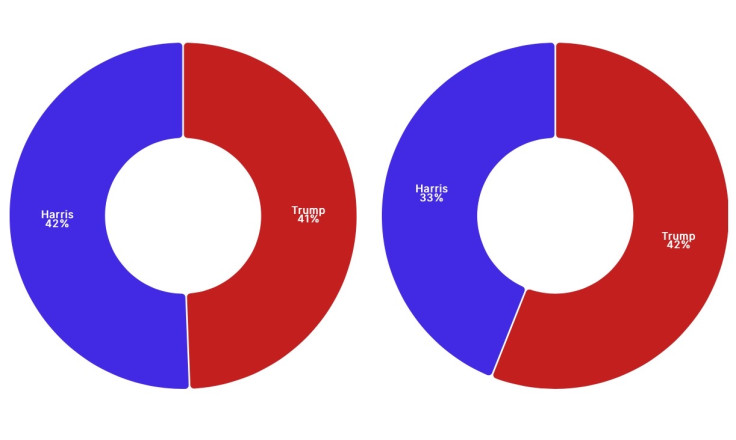US Workers Need Five Lifetimes To Match CEO Pay—And A Trump Vote Could Make It Worse: Report
Just 25% of voters described the US economy as "excellent" or "good"

As the 2024 presidential election approaches, the economic divide in the United States continues to be a pressing issue for many voters. While inflation has been curbed, concerns about the fairness of economic opportunities and the stark disparity between CEO compensation and average worker pay remain at the forefront.
A recent report from the American Federation of Labour and Congress of Industrial Organisations (AFL-CIO) highlights these concerns, revealing that it would take an average US worker more than five career lifetimes to earn what a CEO makes in just one year. This growing inequality, coupled with the upcoming election, has sparked debate over which candidate can best manage the economy and address these disparities.
The CEO-Worker Pay Gap: A Widening Chasm
The AFL-CIO's report sheds light on the staggering disparity between the earnings of CEOs and average workers. According to the report, CEO compensation has reached levels that are hundreds of times greater than what the typical employee earns annually. This inequity has persisted despite a slowdown in inflation, as large corporations continue to maintain high prices while reaping substantial profits. The report suggests that this growing gap between the rich and the working class is a significant concern for the future of the American workforce.
The report's findings underscore the imbalance in wealth distribution within the corporate world, where CEOs of major companies enjoy lucrative pay packages, often including salaries, bonuses, and stock options, while the average worker struggles to make ends meet. This disparity has led to increasing frustration among workers, who feel that the economic system is rigged in favour of the wealthy elite.
Trump vs. Harris: Who Can Better Manage the Economy?
In the lead-up to the election, a recent survey by the Financial Times and the University of Michigan Ross School of Business revealed that American voters are divided on who they believe can best manage the economy. The poll shows that 42 per cent of registered voters feel they would be "much" or "somewhat" better off financially if former President Donald Trump wins the upcoming election, compared to 33 per cent who feel the same way about Vice President Kamala Harris.
Interestingly, when it comes to overall trust in handling economic matters, Harris slightly edges out Trump, with 42 per cent of respondents expressing confidence in her ability to steer the economy, compared to 41 per cent for Trump. This marks the first time that Harris has surpassed Trump in economic trustworthiness since the poll began tracking voter sentiments about a year ago. However, other polls continue to show mixed signals, with many voters still favouring Trump on economic issues.
Voter Sentiments: Mixed Signals on Economic Trust
While the Financial Times-University of Michigan poll suggests a shift in voter trust towards Harris, other surveys indicate that Trump still holds an advantage in the eyes of many voters when it comes to managing the economy. For example, the All-America Economic Survey conducted by CNBC found that Americans believe Trump would improve their financial situation more than Harris, by a margin of 2-to-1. This sentiment was echoed in a Bloomberg News/Morning Consult survey, where swing-state voters favoured Trump over Harris on economic matters by 50 per cent to 42 per cent.
These mixed results reflect the complex and often contradictory views of the American electorate. While some voters may trust Harris's approach to economic management, others believe that Trump's policies would better serve their financial interests.
Trump's Economic Policies for 2024: A Closer Look

Donald Trump's campaign for the 2024 election includes a range of policy proposals aimed at addressing economic concerns, although some analysts argue that these policies could exacerbate the economic inequalities highlighted in the AFL-CIO report. Among his promises, Trump has vowed to use a "massive dragnet" to capture and remove millions of unauthorised migrants, restore the travel ban, and halt refugee admissions, which were overturned by the Biden administration.
One of Trump's key economic promises is to extend the Tax Cuts and Jobs Act tax breaks, which were implemented during his presidency and are set to expire in 2025. Critics argue that these tax breaks primarily benefit the wealthy and large corporations, potentially widening the economic gap between the rich and the poor.
Trump has also pledged to build a missile defence shield in the United States, similar to Israel's Iron Dome, and to ban transgender athletes from competing in women's sports. On social issues, Trump has promised to "guard the vote," a statement that has raised concerns about voter intimidation and the security of future elections.
The Impact of Trump's Policies on Economic Inequality
Analysts warn that Trump's economic policies could further entrench the disparity between CEO compensation and worker pay. By extending tax cuts that disproportionately benefit the wealthy and large corporations, Trump's policies may exacerbate the existing inequalities in the American economy. The AFL-CIO report highlights the need for policies that promote fair wages and reduce the economic divide, but critics argue that Trump's approach could move the country in the opposite direction.
As the election draws nearer, the debate over which candidate can best manage the economy and address these deep-seated inequalities will likely intensify. For many American workers, the choice between Trump and Harris may come down to who they believe will offer a fairer, more equitable economic future.
© Copyright IBTimes 2025. All rights reserved.





















